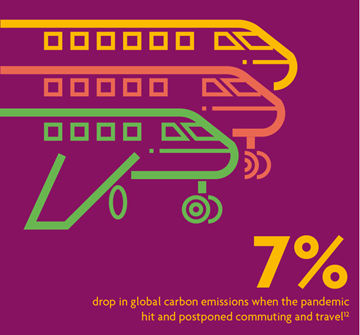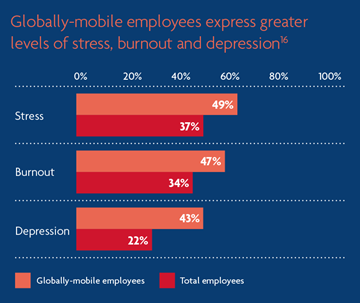NEWS
Wednesday 8 December 2021
Two colleagues meet in the business class lounge, ready to take flight and meet their most important client at their head office in Dubai. Not only are they feeling positive about the chance to build a better relationship with the client and secure a potentially huge deal for their business, it’s the middle of winter so they’re excited to feel the sun on their skin and experience the culture of the UAE. Scenes like this were pretty common before 2020, when the only thing potentially blocking business trips was budget restrictions.
But the COVID-19 pandemic changed everything (not that we really need to tell you that!). Airport lounges were replaced with living rooms, zooming down a runway with Zoom calls and corporate boardrooms with emails. To begin with, people may have worried about the impact on their job and business but soon found that with everyone in the same situation, the virtual meetings they used to scoff at were a good substitution for the real thing.
For a while this year both business and leisure travel started to return to something like the old days – although on a much smaller scale. Now, here we are again, a new variant, some restrictions reintroduced and a stirring of the uncertainty we’d started to forget.
So, are you and your employees keen to get on plane? Do business travellers want to start collecting Air Miles again or do they still prefer to have their feet on the ground a bit more? Have video calls taken the positive relationship-building affects out of business meetings and are they a bit too transactional? Or are the efficiency savings too great for multinationals to ignore?
That’s already a lot to consider and that’s with only barely mentioning the “C” word. COVID is by no means a thing of the past and it’s not as if business travel is easy again. Just look at the lockdowns imposed in Western Europe in November 2021 and yet now more travel concern with the Omicron variant. Things are still very uncertain indeed, and we’re never quite sure what’s going to happen next.
On top of that, there’s the added complication of each country taking different approaches to managing risk; some expect quarantine periods, others need pre-departure testing, or tests on arrivals – travel is now a bit of a minefield!
We looked at the impact of business travel on employers and employees in 2017 but, given that the world has completely changed, we thought this was a good time to revisit the topic and look at whether business travel will take off again in 2022 and think about what you, as employers, can do to support employees when they do need travel for work.
Why travel for business anyway?
 Before we start looking at business travel in a COVID and post-COVID (fingers crossed) world, it’s important to look at why it was sought after for both companies and their staff before the pandemic. For employees, business travel gave the chance to network, see the world and take advantage of career development opportunities. Being asked to travel for work was often considered a sign of trust and status within an organisation too.
Before we start looking at business travel in a COVID and post-COVID (fingers crossed) world, it’s important to look at why it was sought after for both companies and their staff before the pandemic. For employees, business travel gave the chance to network, see the world and take advantage of career development opportunities. Being asked to travel for work was often considered a sign of trust and status within an organisation too.
For many businesses it has made financial sense to send workers around the world. Oxford Economics found that every dollar spent on business travel resulted in US $12.50 in incremental revenue.
And for many businesses it has made financial sense to send workers around the world. Oxford Economics found that every dollar spent on business travel resulted in US $12.50 in incremental revenue.1 This is likely due to the improved relationships formed in person. A Harvard Business Review report found positive impressions of character are more likely to occur face to face when body language and voice play a role in the conversation.2
positive impressions of character are more likely to occur face to face when body language and voice play a role in the conversation.2
Dave Hilfman, executive director of Global Business Travel Association (GBTA), said last year that “people getting together face to face is the only way, really, to achieve ultimate success in business. Many of my colleagues in the industry, be it on the corporate side, the travel side or the supply side, they’re very anxious to get back out on the road again and see their customers and colleagues.”3
Aside from not being able to communicate as effectively, there are downsides to only connecting digitally, too. Research from the University of Tennessee found prolonged, direct eye gaze and the constant shift of on-screen images contribute to something many of us would have become familiar with in 2020 and 2021 – Zoom fatigue! This is the physical and mental exhaustion associated with virtual meetings (and even social events).4
…prolonged, direct eye gaze and the constant shift of on-screen images contribute to something many of us would have become familiar with in 2020 and 2021 – Zoom fatigue!
 Business travel and knowledge sharing
Business travel and knowledge sharing
As well as being good for companies, is business travel also good for global economies?
A study from Harvard’s Growth Lab found that tacit knowledge is crucial to economic growth, which is undermined by virtual communication. The study used transaction data from Mastercard to map the flow of business travel around the world and created a Knowhow Index to map the incoming and outgoing knowledge in every country.
They concluded that mobility and sharing knowledge has a huge impact on the global economy, with a reduction in business travel contributing to a fall in global GDP of nearly 5%.5
Where are we at the end of 2021?
 As we come to the end of our second pandemic-affected year, it’s worth looking at the state of business travel now. Unsurprisingly, in 2020 global business travel expenses contracted by 52%, while corporate travel spending in the US dropped by 71%, the equivalent of US $94 billon.6 Business travel levels have starting to pick up again but at a much slower rate than leisure travel.
As we come to the end of our second pandemic-affected year, it’s worth looking at the state of business travel now. Unsurprisingly, in 2020 global business travel expenses contracted by 52%, while corporate travel spending in the US dropped by 71%, the equivalent of US $94 billon.6 Business travel levels have starting to pick up again but at a much slower rate than leisure travel.
A US Travel Association report estimated that households and businesses spent a total of US $1.1 trillion on travel in 2019.4 Of that, some US $334 billion (nearly one-third) was spent on business travel but this shrunk by 70% in 2020. Yet, leisure travel was down just 27%. Experts expect leisure travel to return to normal in 2022 but the same is not true for business travel. Some estimates are that business travel volume won’t return to normal until 2024 or later.7
Others believe that business travel has hit its peak and will never get back to 2019 levels. A Bloomberg survey of 45 large companies in the US, Europe and Asia found 84% plan to spend less on travel post-pandemic. A majority of those cutting travel budgets saw reductions of between 20-40%, with about two thirds slashing both external and internal in person meetings.8
Thierry Vanlancker, CEO of Akzo Nobel NV, Europe’s biggest paint maker, said “Trips to drum up business could drop by a third, and internal meetings by even more. It’s a good thing for our wallets and helps our sustainability targets. Our customers have had a year of training, so it’s not a social no-go anymore to just reach out by video.”8
But is there a desire from business travellers themselves to hit the road again? A survey of 3,850 business travellers in 25 global markets found an impressive 96% were willing to return to business travel. 54% mentioned a desire to connect with customers and colleagues and a similar number (52%) said it was because they wanted to experience new places.9
It seems that not even a global health crisis has stopped the desire to travel for business and to meet face to face.
The climate change conundrum
Aside from the COVID impact, one of the big considerations from the future of business travel is climate change. Air travel, and specifically business travel, represents 2% of global greenhouse gas emissions, but accounts for an outsized portion of both an individual’s and business’ carbon footprint.10 Analysis from The Guardian suggests one round trip from London to New York generates more emissions than the average person in 56 countries produces in an entire year.11
According to the Global Carbon Project, global carbon emissions dropped 7% in 2020 when the pandemic hit and postponed commuting and travel.12 And a study in the US and Canada found half of companies expect to focus more on the social and environmental impact of business travel programmes post pandemic.13
The pandemic and environmental concerns have created a perfect storm. As we mentioned in our October Viewpoint, more than ever employees want to work for a company that is ethical and reflects their own values, so not taking the environment into account in a post-COVID business travel policy could be costly for talent attraction and retention.14 Plus, businesses have realised they can cope with predominantly online meetings and with an increased focus on climate change and reducing emissions following the recent COP 26, it seems global multinationals have decisions to make about the future of their business travel.
96% of survey respondents were willing to return to business travel
Salesforce case study
According to Fast Company,10 Salesforce employees travelled so much for work in 2019 that they generated 146,000 metric tons of CO2 emissions alone, similar to the carbon from 17,500 homes over the course of a year. And estimates suggest it would take more than 178,000 acres of forest 12 months to appropriate that level of carbon dioxide. In 2020, the company’s total business travel emissions fell to just 20,000 metric tons, a drop of 86% as a result of COVID-19.
Patrick Flynn, Head of Sustainability at Salesforce, said:
A few years ago we committed that we would offset all business travel and employee commuting emissions, pre pandemic… then the pandemic happened, and travel went to zero and our business carried on.”15
Business travel and our health
As if the environment and uncertainty because of COVID-19 lockdowns and regulations weren’t enough to think about, there’s also a third important consideration when looking at the future of business travel – employees’ health. For many people, traveling so much had a detrimental effect on their health, both physically and mentally. This has become even more apparent during the pandemic, with increased mixing and travel leading to potentially higher risks of contracting COVID-19.
Multinationals often have employees that live abroad and commute regularly to the company head office or take on short business assignments abroad. Caring for these globally mobile employees could become expensive with additional testing or higher insurance premium rates. Plus, according to MetLife, globally mobile employees are experiencing higher levels of stress, burnout and depression amid the global pandemic than in previous years, a rising trend. Half (49%) of globally mobile employees report being stressed, compared to around a third (37%) of total employees, while they also report higher burnout (47% vs 34%) and depression (43% vs 22%).16
 And it’s not surprising, with the uncertainty around COVID-19, are experiencing these mental health conditions. Those travelling for business run the risk of being forced to quarantine or could even become stuck away from home for longer than planned if travel regulations change unexpectedly. A highly stressful situation, indeed.
And it’s not surprising, with the uncertainty around COVID-19, are experiencing these mental health conditions. Those travelling for business run the risk of being forced to quarantine or could even become stuck away from home for longer than planned if travel regulations change unexpectedly. A highly stressful situation, indeed.
Half of [business travellers] surveyed didn’t get enough sleep and 30% said they struggled to stay healthy on the road, while a quarter found it difficult to stay in touch with family and friends.
A survey of 500 frequent business travellers found that a fifth reported work-related travel having a negative impact on their mental wellbeing.17 And it isn’t just stress and anxiety, the study found excessive travel can affect relationships, finance and productivity, too.
Sleep is another key factor. Half of those surveyed didn’t get enough sleep and 30% said they struggled to stay healthy on the road, while a quarter found it difficult to stay in touch with family and friends. And we’re at a point in time when everyone is concious of how vulnerable they are which surely makes a good night’s rejuvinating sleep and some time with family matter just that little bit more?
What can you do to support your employees who are travelling?
As a multinational employer, you’re facing a tough balancing act. On one hand you have the COVID-19 uncertainty, negative health impacts and the environment. On the other you have the business benefits of travel and face to face meetings, plus the demand from employees to travel and connect in person.
The pandemic has made it clear just how important it is for employers to take their duty of care seriously, analyse potential risks and make sure their employees know exactly what to do in any crisis situation. COVID-19 risk assessments will be a staple of all corporate travel programmes for some time to come and it is unlikely that any employer will want, or be able, to force anyone to travel. While research shows in person meetings can be more effective, it will be the employers responsibility to make sure that the travel is worth the risk.
Data has an important role to play, too. When designing employee friendly corporate travel programmes post pandemic, organisations may want to consider the broader cost of travel. While cost control is vital, business travel should be viewed more broadly in the context of operations, revenue streams and human impact. Corporate travel teams should work with HR and Finance to get a complete picture. If organisations use travel and HR data, they can see if there is a correlation between travel and illness. Adding financial data to the mix means businesses can look at productivity and insurance premiums, too.
Employers could also support their employees they ask to travel in other ways.
- Ensure that employees know what employee benefits are available to them and that they have access to healthcare in case of emergency when abroad.
- Business travel insurance was always important before, but now it’s vital to provide support if anything happens while on a business assignment.
- Offer employee assistance programmes (EAPs) and other mental health support for those regularly travelling for business.
- Send employees on fewer trips but have them stay at higher-cost hotels so they can access fitness facilities and have a better selection of healthy foods.
- Provide information about the impact of food choices and ensure that sustenance budgets are high enough for employees to make the healthy choice.
- Ensure employees are given ample recovery time after travel to minimise the health impacts of travel.
- Offer employees more downtime while they are away on business trips to include leisure time and the chance to experience the place they’re travelling to – something many employees are keen to do.
What does the future hold?
The future of business travel is a complicated one and we don’t think anyone knows what will unfold in the coming months and years. When business travel returns, it probably won’t look the same as it did in 2019. Multinationals will have COVID, the environment, employee health and – with the growth of virtual meetings – the overall value of the trip to consider.
The vaccination question will be a key consideration for any employer. Many countries require visitors to be fully vaccinated; will employers make that a condition of travel too? What will employers do if they require someone to travel but that employee won’t get vaccinated?
But, after months of being confined to our homes, there is likely to be a great number of people all too happy to hop on a plane for a client meeting.
Whatever the future holds, it’s key that employers get the balance right, between the benefits for the business of face-to-face meetings, the individual feelings towards travel and the support they can provide to manage stress and keep disruption to a minimum.
Business travel is at an interesting crossroads – will it take flight or stay grounded?

1 Anon, Oxford Economics https://www.oxfordeconomics.com/Media/Default/Industry%20verticals/Tourism/US%20Travel%20Association-%20ROI%20on%20US%20Business%20Travel.pdf (sourced November 2021)
2 Paul J. Zak, Harvard Business Review https://hbr.org/2017/01/the-neuroscience-of-trust (sourced November 2021)
3 Natasha Frost, BBC https://www.bbc.com/worklife/article/20200731-how-coronavirus-will-change-business-travel (sourced November 2021)
4 Monique Mardinian, Forbes https://www.forbes.com/sites/forbesbusinesscouncil/2021/10/05/returning-to-business-travel-post-pandemic-could-re-ignite-trust/?sh=54bed7ba2ebc (sourced November 2021)
5 Michele Coscia, Frank M. H. Neffke & Ricardo Hausmann, Nature.com https://www.nature.com/articles/s41562-020-0922-x (sourced November 2021)
6 Jenna Benefield, Vik Krishnan, Esteban Ramirez, and Matthew R. Straus, McKinsey https://www.mckinsey.com/industries/travel-logistics-and-infrastructure/our-insights/the-comeback-of-corporate-travel-how-should-companies-be-planning (sourced November 2021)
7 Anon, USTA https://www.ustravel.org/press/new-forecast-signals-long-road-recovery-business-travel (sourced November 2021)
8 Alexander Michael Pearson, Tara Patel and William Wilkes, Bloomberg https://www.bloomberg.com/news/features/2021-08-31/will-business-travel-come-back-data-show-air-hotel-travel-forever-changed (sourced November 2021)
9 Anon, Concur https://www.concur.com/newsroom/article/survey-uncovers-travelers-requirements-return-to-business-travel (sourced November 2021)
10 Kristin Toussaint, Fast Company https://www.fastcompany.com/90632762/its-time-to-reassess-the-role-of-business-travel-in-global-warming (sourced November 2021)
11 Niko Kommenda, The Guardian https://www.theguardian.com/environment/ng-interactive/2019/jul/19/carbon-calculator-how-taking-one-flight-emits-as-much-as-many-people-do-in-a-year (sourced November 2021)
12 Matt McGrath, BBC https://www.bbc.co.uk/news/science-environment-55261902 (sourced November 2021)
13 Eric Friedrichsen, World Economic Forum https://www.weforum.org/agenda/2021/09/business-travel-wont-be-more-sustainable-post-covid-unless-companies-take-action/ (sourced November 2021)
14 Anon, MAXIS GBN https://maxis-gbn.com/news-events/latest-news/corporate-social-responsibility-and-employee-benefits/ (sourced November 2021)
15 Anon, Salesforce https://www.salesforce.com/news/wp-content/uploads/sites/3/2020/08/sustainability-FY20-stakeholder-impact-report.pdf (sourced November 2021)
16 Anon, MetLife https://www.metlife.com/employee-benefit-trends/metlife-expat-ebts-2021/ (sourced November 2021)
17 Robert Curley, Business Traveller https://www.businesstraveller.com/business-travel/2020/01/01/business-travel-is-tough-on-mental-health-survey-suggests/ (sourced November 2021)
This document has been prepared by MAXIS GBN and is for informational purposes only – it does not constitute advice. MAXIS GBN has made every effort to ensure that the information contained in this document has been obtained from reliable sources, but cannot guarantee accuracy or completeness. The information contained in this document may be subject to change at any time without notice. Any reliance you place on this information is therefore strictly at your own risk. This document is strictly private and confidential, and should not be copied, distributed or reproduced in whole or in part, or passed to any third party.
The MAXIS Global Benefits Network (“Network”) is a network of locally licensed MAXIS member insurance companies (“Members”) founded by AXA France Vie, Paris, France (AXA) and Metropolitan Life Insurance Company, New York, NY (MLIC). MAXIS GBN, a Private Limited Company with a share capital of €4,650,000, registered with ORIAS under number 16000513, and with its registered office at 313, Terrasses de l’Arche - 92 727 Nanterre Cedex, France, is an insurance and reinsurance intermediary that promotes the Network. MAXIS GBN is jointly owned by affiliates of AXA and MLIC and does not issue policies or provide insurance; such activities are carried out by the Members. MAXIS GBN operates in the UK through its UK establishment with its registered address at 1st Floor, The Monument Building, 11 Monument Street, London EC3R 8AF, Establishment Number BR018216 and in other European countries on a services basis. MAXIS GBN operates in the U.S. through MetLife Insurance Brokerage, Inc., with its address at 200 Park Avenue, NY, NY, 10166, a NY licensed insurance broker. MLIC is the only Member licensed to transact insurance business in NY. The other Members are not licensed or authorised to do business in NY and the policies and contracts they issue have not been approved by the NY Superintendent of Financial Services, are not protected by the NY state guaranty fund, and are not subject to all of the laws of NY. MAR00963/1221